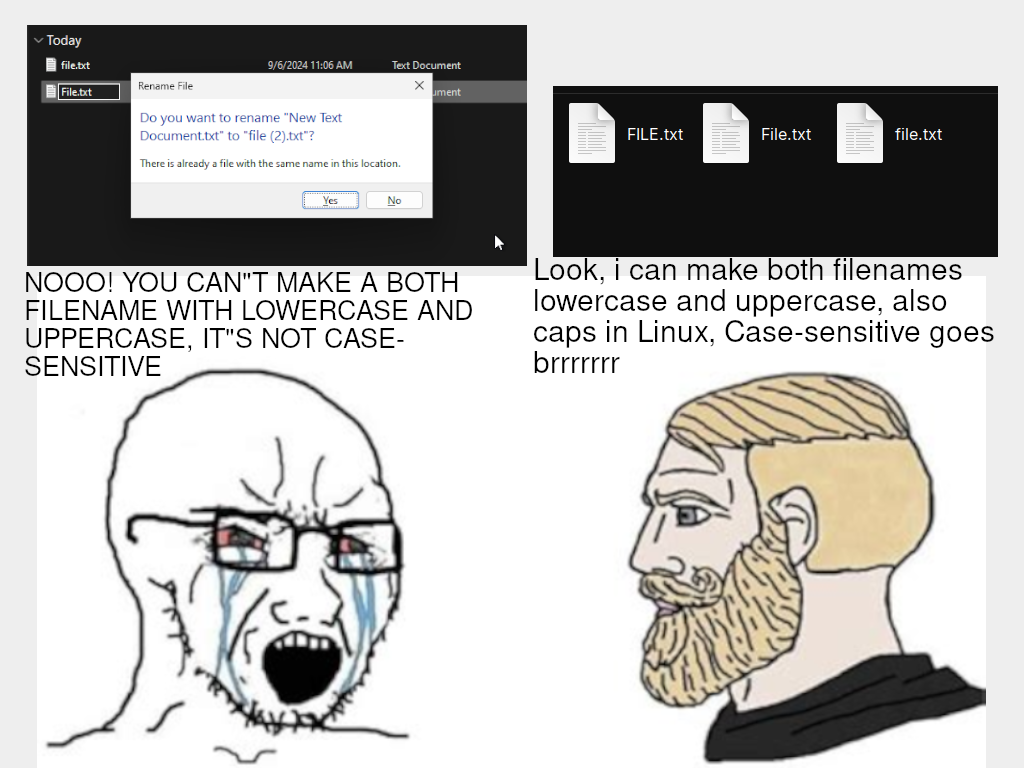this post was submitted on 06 Sep 2024
605 points (90.3% liked)
linuxmemes
21378 readers
1298 users here now
Hint: :q!
Sister communities:
Community rules (click to expand)
1. Follow the site-wide rules
- Instance-wide TOS: https://legal.lemmy.world/tos/
- Lemmy code of conduct: https://join-lemmy.org/docs/code_of_conduct.html
2. Be civil
- Understand the difference between a joke and an insult.
- Do not harrass or attack members of the community for any reason.
- Leave remarks of "peasantry" to the PCMR community. If you dislike an OS/service/application, attack the thing you dislike, not the individuals who use it. Some people may not have a choice.
- Bigotry will not be tolerated.
- These rules are somewhat loosened when the subject is a public figure. Still, do not attack their person or incite harrassment.
3. Post Linux-related content
- Including Unix and BSD.
- Non-Linux content is acceptable as long as it makes a reference to Linux. For example, the poorly made mockery of
sudoin Windows. - No porn. Even if you watch it on a Linux machine.
4. No recent reposts
- Everybody uses Arch btw, can't quit Vim, and wants to interject for a moment. You can stop now.
Please report posts and comments that break these rules!
Important: never execute code or follow advice that you don't understand or can't verify, especially here. The word of the day is credibility. This is a meme community -- even the most helpful comments might just be shitposts that can damage your system. Be aware, be smart, don't fork-bomb your computer.
founded 1 year ago
MODERATORS
you are viewing a single comment's thread
view the rest of the comments
view the rest of the comments

So is Linux, but it puts stuff like that in /dev
The thing is, a lot of the legacy backwards compatible stuff that's in Linux is because a lot of things in Unix were actually pretty well thought out from the get go, unlike many of the ugly hacks that went into MSDOS and later Windows and overstayed their welcome.
Things like: long case sensitive file names from the beginning instead of forced uppercase 8.3 , a hierarchical filesystem instead of drive letters, "everything is a file" concept, a notion of multiple users and permissions, pre-emptive multitasking, proper virtual memory management instead of a "640k is enough" + XMS + EMS, and so on.
It still amazes me how well thought out unix was for the era when computing was in its infancy. But I guess that is what you get with computer science nerds from Universities and a budget for development based on making a product the goal, not quarterly profit the goal.
It's what you get when you design an OS for a mainframe computer that is accessed by many users sharing its resources.
DOS was designed for single-user PC's with very limited processing power, memory and storage, and no access to networked drives. Lots of its hacks and limitations saved a few hundred bytes of memory, which was crucial at the time.
I guess i was meaning compared to DOS but modern Windows, where stupid stuff is broken, and they care more about ads than creating a clean OS
Unix was designed for mainframes, qdos/msdos was designed to be a cpm knockoff the local nerd could use to play commander keen and do his taxes. It's actually impressive how much modern/business functionality they were able to cram into that.
Unix was never for mainframes. It was for 16-bit minicomputers that sat below mainframes, but yes they were more advanced than the first personal computers.
Absolutely, but you have to admit that it's a less solid foundation to build a modern operating system on.
In the 80s, there were several Unices for PC too btw: AT&T, SCO, even Microsoft's own Xenix. Most of them were prohibitively expensive though.